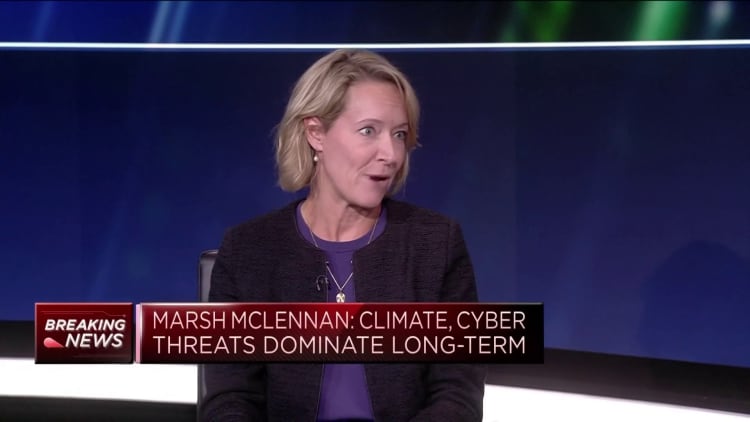As around half of the world's adult population heads to the polls in a bumper year of elections, concern over the role of artificial intelligence in disrupting outcomes has topped the list of the biggest risks for 2024, according to a new report.
The World Economic Forum's "Global Risks Report 2024," released Wednesday, ranked AI-derived misinformation and disinformation — and its implications for societal polarization — ahead of climate change, war and economic weakness in its top 10 risks over the next two years.
"AI can build out models for influencing large populations of voters in a way that we haven't seen before," Carolina Klint, chief commercial officer for Europe at consultancy Marsh McLennan, which co-produced the report, told CNBC's Silvia Amaro.
"How that is going to play out is going to be quite important for us to watch," she added.
Looking further ahead, the balance of risks for the next decade shifts toward extreme weather conditions and critical changes to the political world order, with two-thirds of those surveyed anticipating a new multipolar or fragmented world to take shape.

The WEF report, which was also produced in collaboration with Zurich Insurance Group, surveyed over 1,400 global risk experts, policymakers and industry leaders in September 2023 about their biggest global concerns.
The report's authors said the combined risks are "stretching the world's adaptative capacity to its limit," and called on leaders to focus on global cooperation and building guardrails for the most disruptive emerging risks.
"An unstable global order characterized by polarizing narratives and insecurity, the worsening impacts of extreme weather and economic uncertainty are causing accelerating risks – including misinformation and disinformation – to propagate," Saadia Zahidi, WEF's managing director, said.
"World leaders must come together to address short-term crises as well as lay the groundwork for a more resilient, sustainable, inclusive future," she added.
Top 10 global risks
The most cited risks for the next two years were, in order: misinformation and disinformation, extreme weather events, societal polarization, cyber insecurity and interstate armed conflict. Also in the top 10 were lack of economic opportunity, inflation, involuntary migration, economic downturn and pollution.
Extreme weather events, critical change to earth systems, biodiversity loss and ecosystem collapse, natural resource shortages and misinformation and disinformation were named as the most likely risks over the next 10 years. Adverse outcomes from AI technologies was also named as a longer-term concern.
Top 10 risks
"Artificial intelligence breakthroughs will radically disrupt the risk outlook for organizations with many struggling to react to threats arising from misinformation, disintermediation and strategic miscalculation, Klint said in the report.
"At the same time, companies are having to negotiate supply chains made more complex by geopolitics and climate change and cyber threats from a growing number of malicious actors. It will take a relentless focus to build resilience at organizational, country and international levels – and greater cooperation between the public and private sectors – to navigate this rapidly evolving risk landscape," she added.
The report comes as global leaders are due to meet next week in Davos, Switzerland for WEF's annual summit, during which they will discuss global issues including the ongoing conflicts in Europe and the Middle East, the economy and technology, under the event's tagline "Rebuilding Trust."
It also comes as the world embarks on a historic year of elections, with Taiwan this weekend kickstarting the elections, which are also due in the U.S., India, Russia, South Africa and Mexico.
In a separate 2024 global risks report released Monday, Eurasia Group named the upcoming U.S. election as its top risk for the year, with "ungoverned AI" also ranking among the top five.
Ian Bremmer, president and founder of Eurasia Group, said in a press briefing that given the wider reaching ramifications of the election outcome, the consultancy had "no choice" but to rank the risk ahead of the wars between Russia and Ukraine and Israel and Hamas.







